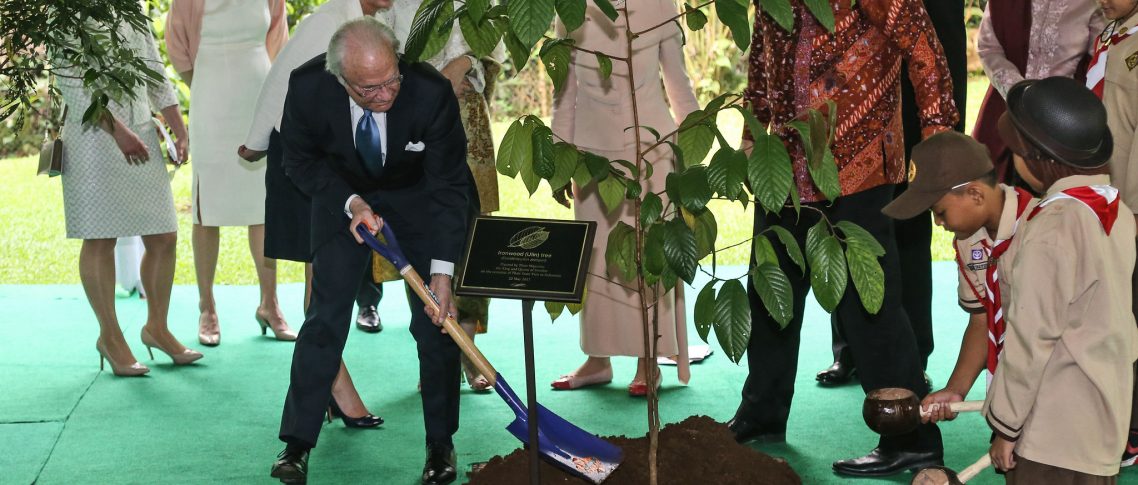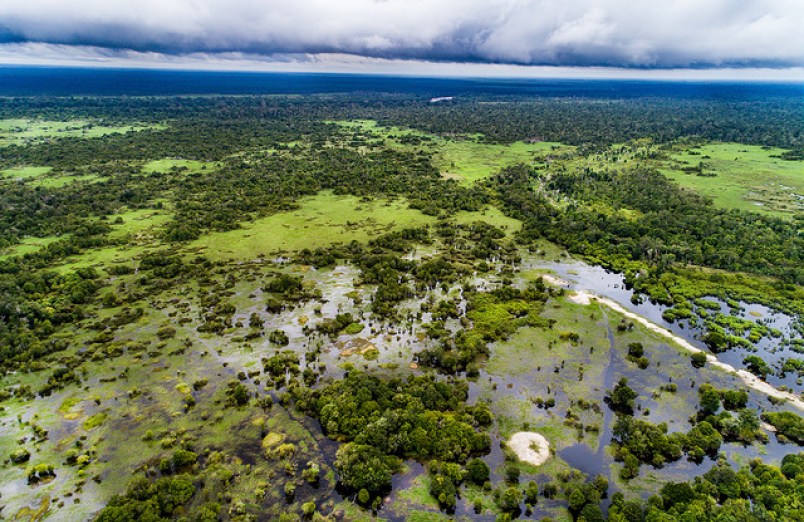Indonesia, Sweden and the Center for International Forestry Research (CIFOR) share the vision of a more sustainable world, in which forestry research and innovation play a critical role.
Their Majesties the King and Queen of Sweden visited CIFOR’s global headquarters in Bogor, Indonesia on May 22. They attended a seminar where scientists from CIFOR and government officials and business leaders analyzed the role of forestry in sustainable development.
“Indonesia and Sweden can learn from each other when it comes to forestry,” said CIFOR’s Director General, Peter Holmgren. “Both countries are taking great responsibility for future climate action, biological diversity and sustainable management of forest resources.”
“Learning, based on science, is a basis for that sustainable future we want,” said Holmgren. “CIFOR’s research work aims to demonstrate and ensure that forestry contributes to all 17 Sustainable Development Goals.”
To mark the occasion, Their Majesties the King and Queen of Sweden planted an ironwood tree to symbolize Sweden’s sustainable forestry practices and CIFOR’s long-term perspectives in forestry, which are necessary to balance social, economic and environmental concerns.

* Read the full transcript of Peter Holmgren’s Opening Speech for this special occasion below
Your Majesties, Excellencies, and friends, I recently visited the forest faculty in Umeå, in the north of Sweden, where Ann-Sofie and I studied forestry once upon a time.
It’s a good feeling to be back and it struck me again how much Sweden and Indonesia can learn from each other when it comes to forestry.
Today, we have a moment to demonstrate how important forestry is for the future we want. We want sustainable development for all. And in this seminar, we want to show how forestry contributes to every dimension and all the goals.
So, if we talk about eliminating poverty and hunger; improving health; building smart cities; providing water and renewable energy; education; ensuring rights, gender equality and equal opportunities; building strong institutions; securing climate on earth; conserving and restoring life on land and under water; making reliable investments and value chains and building new partnerships; and perhaps, most of all, caring for the well-being and future of our children and their children and so on, forestry embraces all of this. And therefore, is what our efforts at CIFOR are about.
Our strategy, as you can see on the screen, is designed to contribute to all of the 17 Sustainable Development Goals (SDGs) that the world has agreed on. Through our research teams, we ensure that focus is maintained on each aspect of the SDG framework.
In contrast, in the public debate among advocacy organizations in national policies and in the international negotiations, we usually hear about forests as an environment issue. Global challenges such as climate change, ending deforestation, and protecting wildlife take up most of the bandwidth in media.
Of course, these are real and very, very important challenges. But unfortunately, the priorities and needs of local and rural communities seldom make the headlines. Communities, which are often among the world’s poorest and disadvantaged. This is where the benefits and opportunities of forestry come together and have the greatest impact. And this is where our focus needs to be.
So seeing how the wealthy parts of the world consider forests, one could say that forests have been put in the global environment corner. And to that I say, ‘Nobody puts forests in a corner.’
One could say that forests have been put in the global environment corner. And to that I say, ‘Nobody puts forests in a corner.’
Let me turn to the topic of research. Everyone here in the Global Forestry Hall agrees that research is an essential ingredient in development. This is why CIFOR and our sibling organization ICRAF deliver high-quality science that is credible and relevant for policy and practice. This is the core of our mission.
But science is under threat. Defending the credibility and relevance of science has become a mission in itself. We live in a world where post-truth populism and alternative facts often set the political agenda. A world where scientists see the need to take to the streets to advocate for their mission. And in that process, risking to profile science as just another special interest. As a result, funds for research are increasingly difficult to mobilize. We feel that pressure as well.
It is thus politically opportune to invest in science. I want to extend my hope to Indonesia as our host country, and Sweden as one of CIFOR’s founding countries and a leading forest country in the world, to stand up for science in general, and funding of forestry research in particular.
At CIFOR, we are clear that doing excellent research is in itself not enough to achieve the impacts we aspire to. So that is why we also emphasize learning. We helped developed a forest faculty in Eastern Congo; we support Indonesian students to acquire Master’s degrees overseas; and we carry out a variety of trainings and prepare educational materials. Learning based on science is the basis for the sustainable future we want.
We also emphasize outreach and engagement. Forestry research is not worth much, unless it is communicated, understood, and ultimately used by many. This, we believe, is also the path to regain a broad trust in science. Post post-truth if you’d like.
Finally, I want to talk about landscapes and the need for integrated solutions. So much of our future depends on how we manage our landscapes. In the Nordic countries, we share a history of poverty. Many of you recognize this painting from the late 19th century. It’s from Finland, but it could have been Sweden. The situation of poor people living off the land. And in our countries, we made a long journey since then.
The thing is, we still have this reality in many places around the world. This is a recent picture from Brazil, and I’m sure you can see the similarities. So, we can say that if we are to achieve sustainable development, then it is in landscapes we must place our role.
We have a tendency to isolate sectors as experts. And to isolate institutions. But in the landscapes, the solutions must come together across agriculture, forestry, mining, energy, water, finance, infrastructure, tenure, rights and law. And we don’t seem to pay enough attention on how this integration is to happen.
And actually, real landscapes are where our science and research can become the most useful for people. This is why integrated landscape approaches has become an important foundation for CIFOR’s work. We challenge the conventional institutional fragmentation and seek new ways of collaborating and discovering opportunities and solutions.
It’s not always easy. Habits, safety and comfort in our own subjects, our own sectors, our own institutions, may make us feel threatened. The roots are deep. So we need to work in new partnerships. CIFOR is leading the Global Landscapes Forum, which has just become a platform for thousands of partners from every sector and walk of life.
We want to advance sustainable landscapes. In the next five years, we aim to reach and involve one billion people as a global community of landscapes. We think, that like the World Economic Forum, the Global Landscapes Forum is on track to become a major positive factor for sustainable development founded in research and focusing on local priorities.
So, your Majesties, Excellencies, it’s been a privilege to share some thoughts about the breadth and diversity of forestry. It’s also a privilege to work with all members of the CIFOR global team to really make a difference that counts, proving how forestry and landscapes can enhance the environment and well-being for all. Thank you very much.
*CIFOR and Sweden have strong ties, from the founding of CIFOR in 1993 by Sweden, Switzerland, Australia, and the USA, together with the government of Indonesia, to CIFOR’s current Director General Dr. Peter Holmgren, who is a Swedish national.
We want you to share Forests News content, which is licensed under Creative Commons Attribution-NonCommercial-ShareAlike 4.0 International (CC BY-NC-SA 4.0). This means you are free to redistribute our material for non-commercial purposes. All we ask is that you give Forests News appropriate credit and link to the original Forests News content, indicate if changes were made, and distribute your contributions under the same Creative Commons license. You must notify Forests News if you repost, reprint or reuse our materials by contacting forestsnews@cifor-icraf.org.
